In the dynamic world of e-commerce, the ability to stand out and offer a unique shopping experience is paramount for businesses of all sizes. Custom Shopify stores are at the forefront of this e-commerce revolution, providing a tailored and flexible solution that allows businesses to create distinct online retail platforms.
With the power to customize everything from design and functionality to product offerings and branding, custom Shopify stores offer a world of possibilities for entrepreneurs and enterprises alike. In this article, we delve into the world of custom Shopify stores, exploring what they are, why they are essential, and how they shape online commerce’s future.
Introduction to Custom Shopify Stores
Custom Shopify stores are created to address a given company’s requirements specifically. It can include anything from custom features and functionality to unique branding and design.
Custom Shopify stores are a good option for businesses that:
- Need a store that is tailored to their specific needs and requirements
- Want a store that is unique and stands out from the competition
- Have a large product catalog or complex business model
- Need a store that can scale with their business
There are two main ways to create a custom Shopify store:
- Hire a Shopify developer: This is the best option for a store with custom features or functionality. A Shopify developer can create a store tailored to your needs and requirements.
- Buy Custom Shopify store: You can order a custom Shopify store from a well-known platform like Bebiggy.
- Use a custom Shopify theme: This is a good option if you want a store with a unique design and branding. There are several custom Shopify themes available online, both free and paid.
Once you have created your custom Shopify store, you must manage and keep it current. This includes adding new products, updating existing products, and processing orders. You will also need to market and promote your store to potential customers.
Here are some examples of custom Shopify stores:
- Tesla: Tesla’s Shopify store is a prime example of a custom store with unique branding and design. The store is also highly integrated with Tesla’s other systems, such as its customer relationship management (CRM) system.
- Allbirds: Allbirds’ Shopify store is another example of a custom store with a unique design and branding. The store is also known for its focus on sustainability and its use of eco-friendly materials.
- Gymshark: Gymshark’s Shopify store is a good example of a custom store with a large product catalog and complex business model. The store sells a wide range of fitness apparel and accessories and offers a subscription service.
Exploring Bebiggy: Your Custom E-commerce Solution Destination
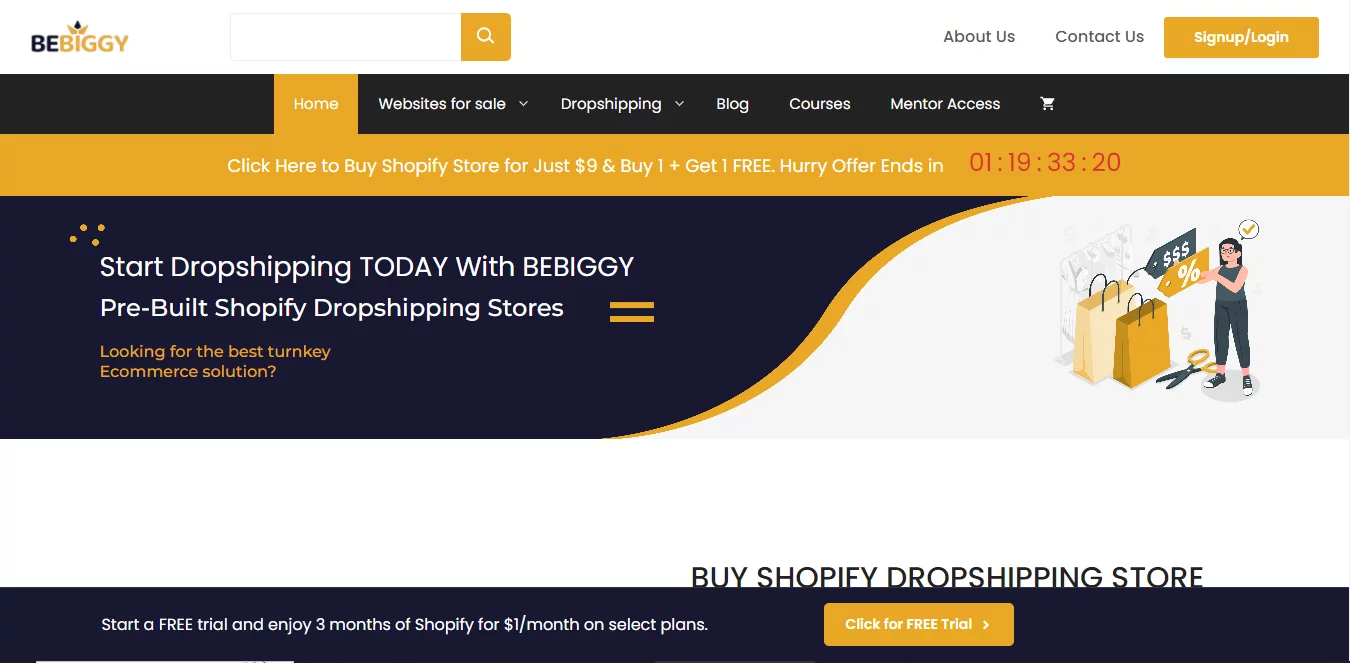
From Bebiggy you can get 3 types of custom Shopify store-
- Custom Starter Shopify Store: 50% discounted price-$119 (Original price was $399)
- Custom Premium Shopify Store: 50% discounted price-$299 (Original price was $599)
- Custom Exclusive Shopify Store: 50% discounted price-$499 (Original price was $999)
A unique Shopify store builder, Bebiggy, assists companies of all sizes in developing and launching profitable online stores. Bebiggy offers a variety of features and services, including:
- Custom Shopify store design: The skilled designers at Bebiggy can build a unique Shopify store that fits your needs and matches your brand.
- Shopify store development: Bebiggy can help you develop your Shopify store, including adding products, setting up payment processing, and configuring shipping options.
- Shopify store marketing: Bebiggy can help you market your Shopify store, including creating social media campaigns and running paid advertising campaigns.
Apart from these fundamental services, Bebiggy provides an array of supplementary features and services, such as:
- Product photography: Bebiggy can help you create high-quality product photography for your Shopify store.
- Product descriptions: Bebiggy can help you write compelling product descriptions for your Shopify store.
- SEO: To reach more prospective customers, Bebiggy can assist you with search engine optimization of your Shopify store.
- Customer support: Bebiggy offers 24/7 customer support to help you with any problems with your Shopify store.
Benefits of Custom Shopify Stores
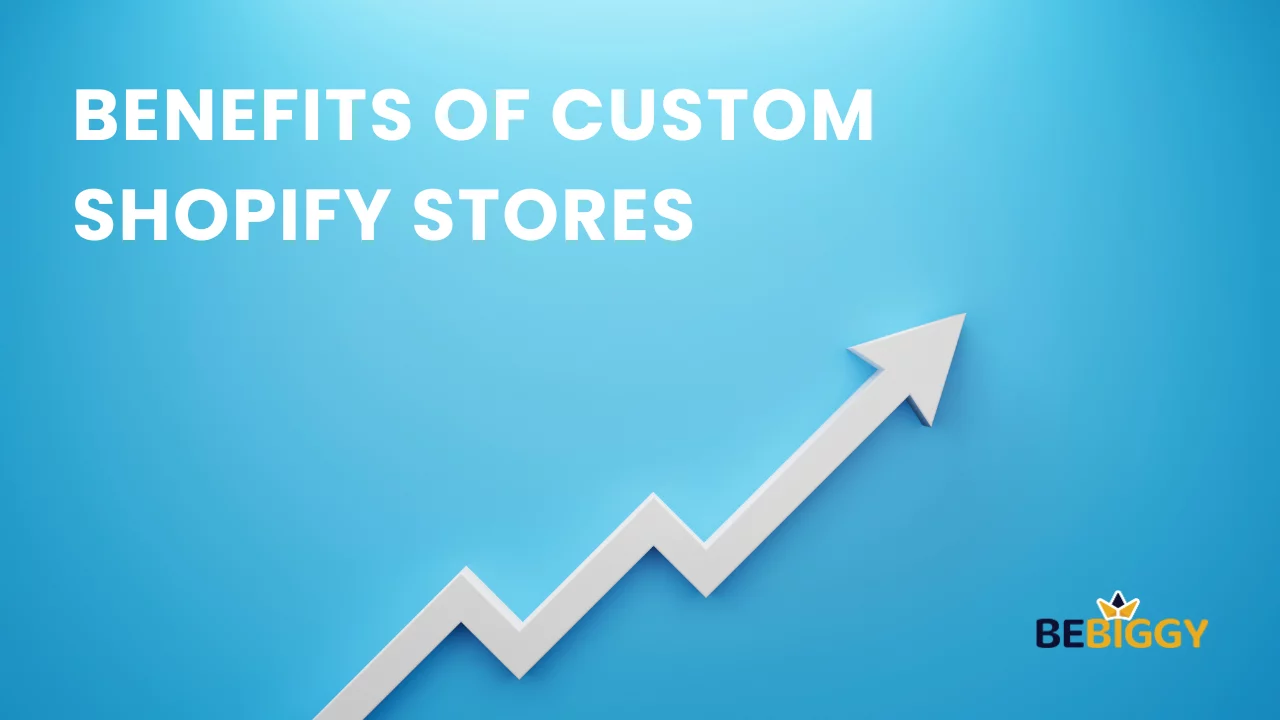
Custom Shopify stores offer several benefits over pre-made Shopify stores, including:
- Unique branding and design: Custom Shopify stores can be designed to match your brand perfectly, from the logo and colors to the overall layout and feel of the store. This can help you to create a unique and memorable experience for your customers.
- Custom features and functionality: Custom Shopify stores can be developed to include any features or functionality that you need, such as product customization, complex shipping options, or integration with your other systems. You may increase client satisfaction and streamline your processes using this.
- Scalability: Custom Shopify stores are scalable, meaning they can grow with your business. Whether you are a small business with just a few products or a large enterprise with thousands of products, a custom Shopify store can handle your needs.
- Security: Custom Shopify stores are secure platforms that protect your customer data and your business from fraud.
- Support: Shopify offers 24/7 support to its customers, including support for custom Shopify stores. This means you can get help with any problems at any time of day or night.
Tailoring Your E-commerce Experience
Tailoring your e-commerce experience means personalizing it to meet your needs and preferences. It can include things like:
- Recommending products catered to your interest: Based on your browsing and purchase history, e-commerce platforms can use algorithms to recommend products you are likely interested in. It can help you to discover new products and make more informed purchase decisions.
- Offering personalized discounts and promotions: Personalised discounts and promotions can also be provided by e-commerce platforms based on your previous browsing and purchase history. This can help you save money on the most interesting products.
- Making it easy to find the products you are looking for: E-commerce platforms can make it easy to find the products you are looking for by providing you with personalized search results and recommendations. This can save you time and effort when you are shopping online.
- Providing a seamless checkout experience: E-commerce platforms can provide a seamless checkout experience by offering you various payment options and making saving your shipping and billing information easy. This can make it quick and easy for you to complete your purchases.
- Offering excellent customer service: E-commerce platforms can offer excellent customer service by providing multiple ways to contact them and resolving any issues you may have quickly and efficiently. This can help you to have a positive overall e-commerce experience.
The Process of Creating a Custom Shopify Store
The process of creating a custom Shopify store can be broken down into the following steps:
- Plan your store: Before you start building your store, it is important to have a plan. This includes deciding on your store’s name, branding, and product offerings. Consider your target audience and what kind of shopping experience you want to provide them.
- Choose a Shopify theme: Shopify offers a variety of free and premium themes. When choosing a theme, it is important to consider your store’s branding and the type of products you sell.
- Customize your theme: After selecting a theme, you can alter it to fit the branding and aesthetic of your store. You can add custom features and functionality to your theme using Shopify apps and plugins.
- Add your products: After customizing your theme, you can add your products to your store. Shopify makes adding products, including product descriptions, images, and pricing easy.
- Set up payment processing: Numerous payment channels, including PayPal, Stripe, and Amazon Pay, are supported with Shopify. The payment gateway that works best for your company can be selected.
- Configure shipping: Shopify offers a variety of shipping options, such as USPS, UPS, and FedEx. You can configure shipping options for each product in your store.
- Launch your store: Once you have added your products, set up payment processing, and configured shipping, you are ready to launch your store. It’s simple to set up your store and begin selling your goods using Shopify.
Here are some more tips for building a profitable bespoke Shopify store:
- Invest in a high-quality theme: A well-designed theme can make a big difference in your store’s look and feel. It is worth investing in a premium theme that is well-coded and mobile-friendly.
- Use high-quality product images: Product images are among the most important factors influencing shoppers’ purchase decisions. Ensure that the product photographs you use appropriately depict your products and are high quality.
- Write clear and concise product descriptions: Product descriptions should be clear, concise, and informative. They should tell shoppers everything they need about your products, including the features, benefits, and specifications.
- Optimize your store for search engines: Increasing traffic requires search engine optimization or SEO. To ensure that customers can quickly locate your store when searching online, optimize it for relevant keywords.
- Promote your store: You must market it to prospective clients after it launches. There are many ways to advertise your store, such as paid advertising, email marketing, and social networking.
Pricing and Budget Considerations

The cost of creating a custom Shopify store can vary depending on several factors, including:
- The complexity of your store’s design and functionality
- The number of products you sell
- The number of features and apps you need
- The cost of Shopify’s monthly subscription plan
In general, you can expect to pay between $5,000 – $20,000 to create a custom Shopify store. However, the price may vary based on the previously mentioned variables.
Here are some tips for budgeting for your custom Shopify store:
- Start with a plan: Before building your store, it is important to have a plan. This includes deciding on your store’s budget, design, and functionality.
- Set priorities: Once you have a plan, you can start to set priorities. What are the most important features and functionality for your store? What can you live without?
- Shop around: Several Shopify developers and designers offer custom store development services. Get quotes from several different providers before making a decision.
- Consider a monthly subscription plan: Shopify offers a variety of monthly subscription plans, which can be a good option if you are on a budget. You can start with a basic plan and upgrade as your business grows.
What is an E-commerce Solution?
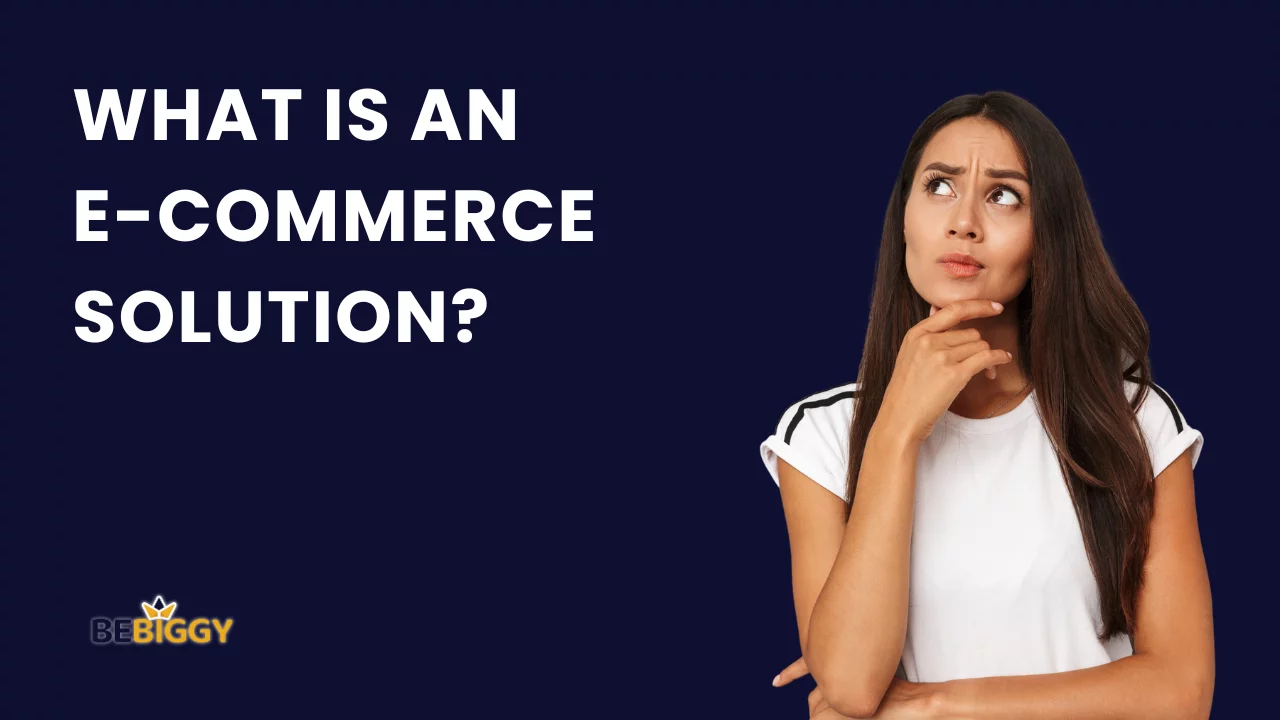
An E-commerce Solution is a comprehensive package of software and services designed to help businesses effectively operate, manage, and expand their online sales and retail activities. It typically includes various components, such as:
- Online Storefront: The solution’s core is a platform where businesses can showcase and sell their products or services to customers.
- Shopping Cart: A feature allowing customers to select and add products to their cart before checkout.
- Payment Processing: Integration with payment gateways to securely process transactions, including credit card payments and digital wallets.
- Inventory Management: Tools to monitor, update, and optimize product listings and stock levels.
- Order Fulfillment: Systems to manage and track customer orders, shipping, and delivery.
- Security: It has robust security measures to protect customer data and transactions.
- Website Design and Customization: It includes options for creating and customizing the look and feel of the online store.
- Marketing and SEO Tools: It comprises features for optimizing the website’s visibility and attracting potential customers.
- Analytics and Reporting: It includes tools to track and analyze sales, customer behavior, and other crucial metrics.
- Customer Support: It entails resources for assisting customers and addressing their inquiries or issues.
Many types of e-commerce solutions exist, such as hosted solutions, open-source platforms, and custom-built systems. The particular needs, financial constraints, and technological prerequisites of a firm all influence the choice of e-commerce solutions. These solutions enable companies to have an online presence, efficiently handle transactions, and give clients a flawless online buying experience.
The Working of E-commerce Solutions
E-commerce solutions play a pivotal role in enabling online businesses to operate effectively. Their functioning involves integrated processes to manage and optimize e-commerce operations. Here’s an overview of how e-commerce solutions work:
- Online Store Setup: The process begins with setting up an online store. Business owners choose a suitable e-commerce platform or solution and customize it to align with their brand’s aesthetics and requirements. This step involves selecting templates, designing the website, and organizing product listings.
- Product Management: E-commerce solutions provide tools to manage products and services. Sellers can add, edit, and categorize their offerings, including details like product descriptions, images, prices, and stock levels. These changes are reflected in the online storefront.
- Shopping Cart and Checkout: Customers can browse products, add products to their shopping carts, and move towards the checkout process. E-commerce solutions facilitate a smooth shopping experience where customers can review their selections, enter shipping and payment information, and confirm orders.
- Payment Processing: E-commerce solutions integrate with payment gateways to securely process transactions. It includes accepting credit card payments, digital wallets, and other payment methods. Security measures ensure sensitive customer information is protected during payment processing.
- Order Management: Once orders are placed, the system manages order fulfillment. It includes generating order notifications, tracking shipment details, and updating inventory levels. Business owners can view and manage orders to ensure timely delivery.
- Security Measures: E-commerce solutions implement robust security protocols to protect customer data and sensitive information. It includes SSL encryption, data backups, and safeguards against fraud.
- Marketing and SEO: E-commerce solutions offer marketing and SEO tools to improve the online store’s visibility. Features like search engine optimization (SEO), email marketing, and social media integration help attract customers and increase website traffic.
- Analytics and Reporting: Business leaders can obtain insights into customer behavior, sales performance, and website traffic by utilizing analytics and reporting solutions. These insights are essential for optimizing the online store and making well-informed decisions.
- Customer Support: E-commerce solutions often provide features like live chat, email support, and help center resources. It aids in addressing customer inquiries, issues, and requests promptly.
- Continuous Optimization: Successful e-commerce businesses continually optimize their online stores based on the insights and data collected. It involves improving product offerings, user experience, and marketing strategies to drive sales and customer satisfaction.
E-commerce solutions come in various forms, including open-source platforms, hosted solutions, and custom-built systems, allowing businesses to choose the best suits their needs and budget. These solutions are fundamental in creating and maintaining an effective and efficient online retail presence.
Some E-commerce solutions for 2024
1. Shopify
Shopify is a renowned e-commerce solution known for its user-friendly interface and extensive features. It offers a broad selection of customizable templates, making it an excellent choice for businesses of all sizes.
- Market share (2023): 28%
- Number of active stores (2023): 6+ million
- Shopify is the most widely used platform at more than 28% of the global e-commerce sector.
- Shopify is a fantastic choice for companies of all sizes because of its many features and reputation for being user-friendly.
- Shopify is also relatively affordable, with monthly plans starting at $25.
2. Wix
Wix provides an all-in-one website builder with e-commerce capabilities, making it an ideal solution for small businesses and startups. Its intuitive drag-and-drop editor simplifies the process of creating an online store.
- Market share (2023): 43%
- Number of active stores (2023): 700K+
- Wix is known for its drag-and-drop builder, making creating a custom online store without coding knowledge easy.
- Wix is also relatively affordable, with monthly plans starting at $24.
3. BigCommerce
BigCommerce offers robust e-commerce tools designed for scaling businesses. With features like multi-channel selling and customizable themes, it’s an excellent choice for ambitious online retailers.
- Market share (2023): 41%
- Number of active stores (2023): 45,670
- BigCommerce is the world’s third most popular e-commerce platform, with a market share of over 41%.
- BigCommerce is known for its scalability and powerful features, making it a good option for large and growing businesses.
- BigCommerce is more expensive than Shopify or Wix, with monthly plans starting at $39.
4. Adobe Commerce (formerly Magento)
Formerly Magento, Adobe Commerce remains a powerful e-commerce platform with a strong focus on customization and scalability. It’s well-suited for larger businesses seeking a tailored online shopping experience.
- Market share (2023): 50%
- Number of active stores (2023): 152,156
- Adobe Commerce is the world’s fourth most popular e-commerce platform.
- Adobe Commerce is known for its flexibility and wide range of features, which makes it a good option for businesses of all sizes.
- Adobe Commerce is open-source, so it is free to download and use. However, businesses will need to pay for hosting and other services.
5. WooCommerce
As a WordPress plugin, WooCommerce is a flexible, open-source e-commerce solution that seamlessly integrates with existing websites. It’s popular among small to medium-sized businesses using WordPress.
- Market share (2023): 25%
- Number of active stores (2023): 4,413,089
- WooCommerce is a fantastic choice for companies of all sizes because of its abundance of features and reputation for flexibility.
- WooCommerce is free to download and use. However, businesses will need to pay for hosting and other services.
6. PrestaShop
PrestaShop is an open-source e-commerce platform known for its flexibility and community-driven support. It’s an excellent choice for businesses looking for a cost-effective solution.
- Market share (2023): 36%
- Number of active stores (2023): 94
- PrestaShop is an open-source, free e-commerce platform with a large feature set and flexibility.
- PrestaShop is a good option for businesses of all sizes, but it can be more difficult to use than other platforms.
7. Squarespace
Squarespace provides an elegant and visually appealing website builder, including e-commerce capabilities. It’s suitable for creatives and artisans looking to showcase their products with style.
- Market share (2023): 93%
- Number of active stores (2023): 294,729
- Squarespace is a website builder with e-commerce functionality.
- Squarespace is well-known for its elegant themes and drag-and-drop builder.
- Small businesses who wish to build a polished web store without knowing how to code should choose Squarespace.
8. GoDaddy
GoDaddy is a viable choice for small enterprises and entrepreneurs because it provides an e-commerce website builder. For an all-in-one solution, it comes with hosting and domain registration.
- Market share (2023): 85%
- Number of active stores (2023): 160,905
- GoDaddy is a web server and domain registrar that provides e-commerce solutions.
- GoDaddy’s e-commerce platform is known for its ease of use and affordable pricing.
- GoDaddy is a good option for small businesses just starting with e-commerce.
Why is Shopify the Best among All?
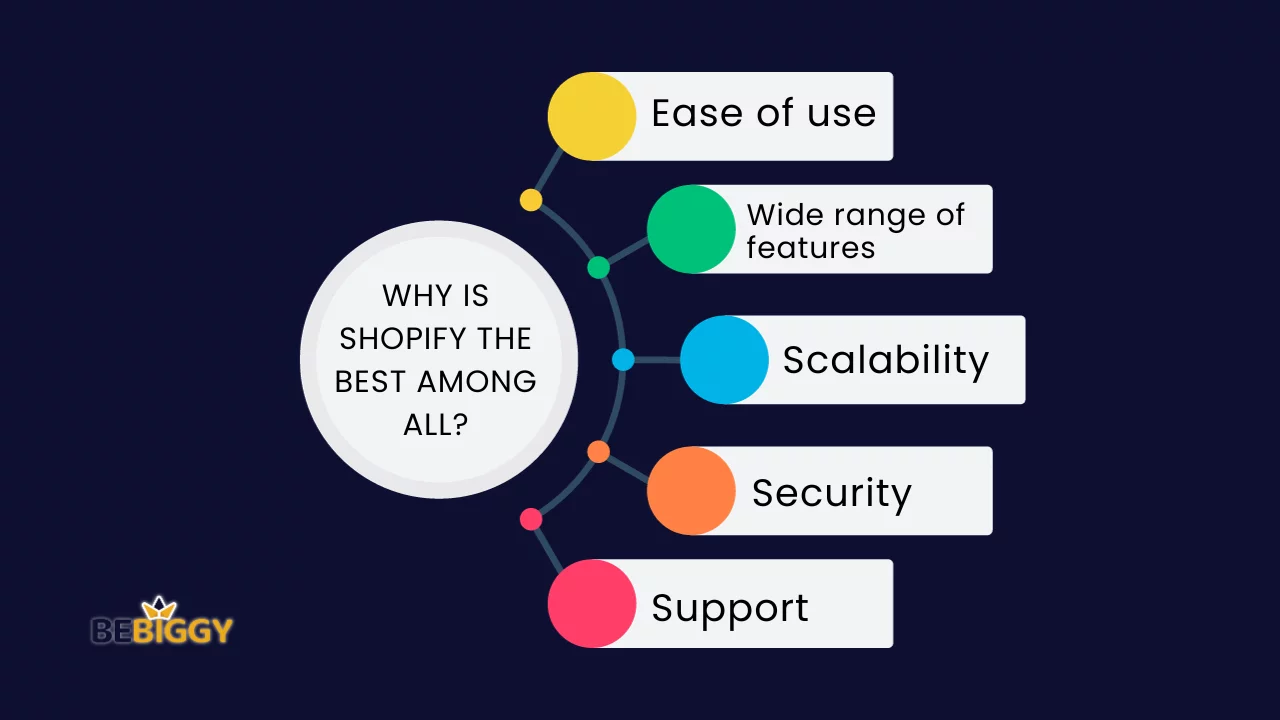
Shopify is the best e-commerce platform for many reasons, including:
- Ease of use: Shopify is one of the easiest e-commerce platforms to use, even for beginners. Its user-friendly interface and drag-and-drop builder make creating and customizing your online store easy.
- Wide range of features: Shopify offers a wide range of features, including product management, payment processing, shipping, and marketing tools. This makes it a one-stop shop for everything you need to start and run a successful online business.
- Scalability: Shopify is scalable, meaning it can grow with your business. Whether you are a small business with just a few products or a large enterprise with thousands of products, Shopify can handle your needs.
- Security: Shopify is a safe and secure platform that protects customer data and businesses from fraud.
- Support: Shopify offers 24/7 support to its customers. It means you can get help with any problems at any time of day or night.
In addition to these general benefits, Shopify offers several specific features that make it a good choice for businesses of all sizes. For example, Shopify offers many payment gateways, including PayPal, Stripe, and Amazon Pay. Thus, this makes it easy for your customers to pay for their purchases. Shopify offers several shipping integrations, including USPS, UPS, and FedEx. This makes it easy to ship your products to customers worldwide.
FAQs about custom Shopify Stores
What are custom e-commerce solutions?
Custom e-commerce solutions are tailor-made online retail platforms, and their purpose is to meet the specific needs of businesses. They involve creating a unique shopping experience, personalized features, and branding to enhance customer engagement.
What is a custom Shopify store?
A custom Shopify store is an online retail platform built on the Shopify framework but uniquely customized to fulfill the specific requirements of a business. It involves creating a store with a distinct design, functionality, and features, making it stand out in the competitive e-commerce landscape.
Can you make a custom Shopify store?
Yes, Shopify offers the capability to create custom stores through expert developers or by using customized themes and applications available in the Shopify ecosystem. These tailor-made stores can meet unique business needs and branding requirements.
Is Shopify an eCommerce solution?
Shopify is an e-commerce solution offering comprehensive tools and features for businesses to set up, manage, and grow online stores. It covers everything from storefront design to payment processing, making it a one-stop e-commerce solution.
What makes the Shopify website unique?
Shopify websites stand out due to their user-friendly interface, drag-and-drop builder, and extensive features that simplify the online store setup process. They offer scalability, security, and 24/7 customer support, ensuring a smooth ecommerce experience.
Why is Shopify better for eCommerce?
Shopify is preferred for e-commerce due to its ease of use, wide range of features, scalability, robust security, and responsive customer support. It accommodates businesses of all sizes, from startups to large enterprises, making it a versatile e-commerce platform.
How do I create a custom product on Shopify?
You can utilize the platform’s product customization options to create a custom product on Shopify. This includes adding product details, images, and variants and using apps or coding to enable unique product configurations to meet your business requirements.
What type of eCommerce is Shopify?
Shopify primarily caters to various e-commerce types, including dropshipping, print-on-demand, retail, and subscription-based models. It’s known for its flexibility, allowing businesses to adapt to their preferred e-commerce model.
Which is better, WooCommerce or Shopify?
WooCommerce, as a WordPress plugin, provides a high level of customization but requires more technical knowledge. Shopify offers a user-friendly, all-in-one solution with a lower learning curve, making it suitable for beginners and those seeking convenience. So, Shopify is better.
Where Can I Purchase Top-Quality Pre-Built Stores?
Discover exceptional pre-built Shopify stores available at BeBiggy, offering a comprehensive eCommerce store selection with fully optimized options for your convenience.
Conclusion
In conclusion, custom Shopify stores offer a tailored e-commerce solution that empowers businesses to create unique, personalized, and efficient online retail platforms. These stores cater to individual business needs, whether specific branding, complex product catalogs, or scalable operations.
With a focus on design, functionality, and scalability, custom Shopify stores provide the flexibility required to stand out in the competitive e-commerce landscape. As businesses continue to unlock their e-commerce potential through customization, the significance of these custom stores remains on the rise, offering a promising future for online retailers.

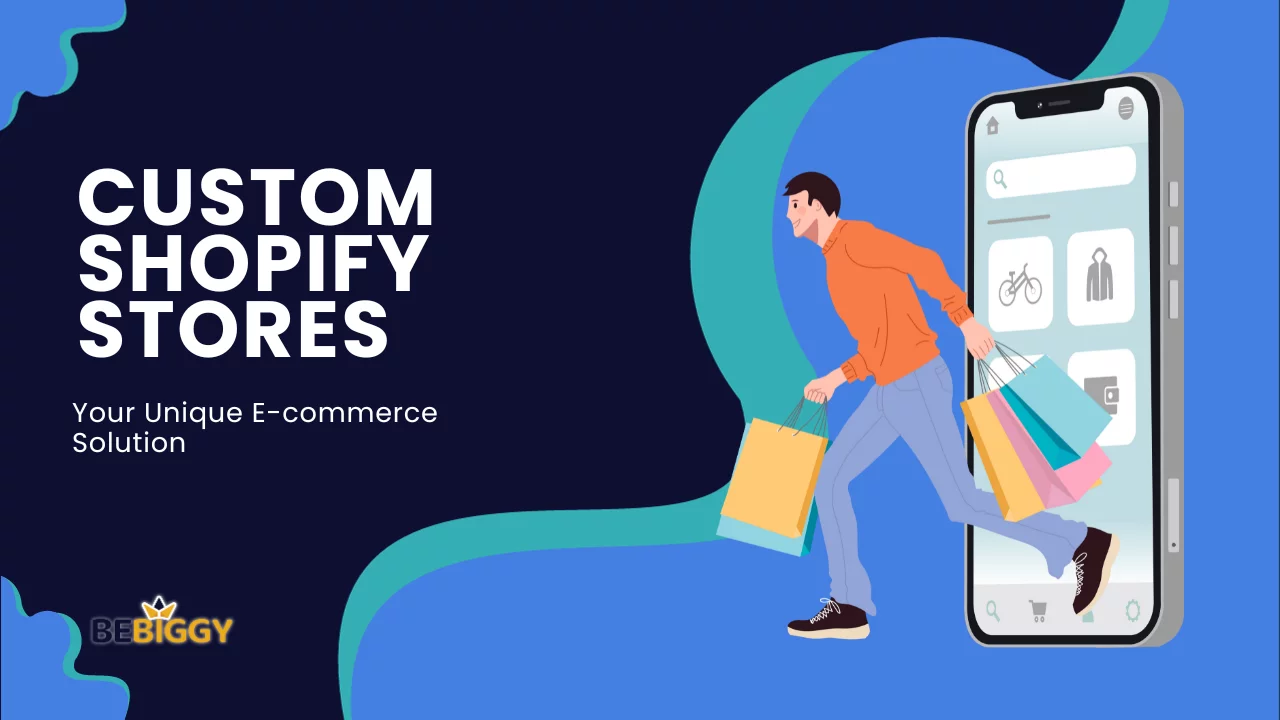







 What Is Shopify Dropshipping and How Does It Work?
What Is Shopify Dropshipping and How Does It Work? 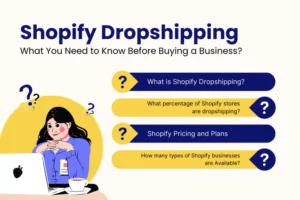 Shopify Dropshipping: What You Need to Know Before Buying a Business?
Shopify Dropshipping: What You Need to Know Before Buying a Business?  How to Dropship on Shopify: Step-by-Step Guide
How to Dropship on Shopify: Step-by-Step Guide  Guide to Finding Reliable Shopify Dropshipping Suppliers [100% Success]
Guide to Finding Reliable Shopify Dropshipping Suppliers [100% Success]